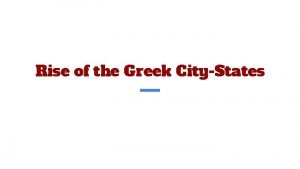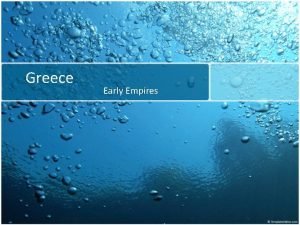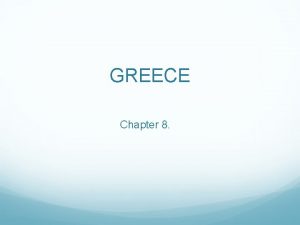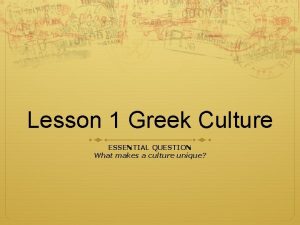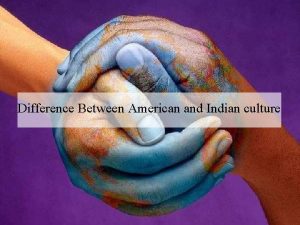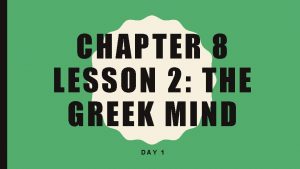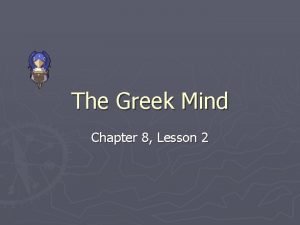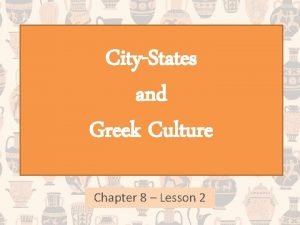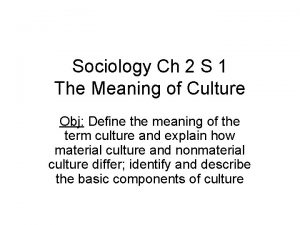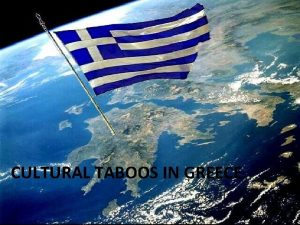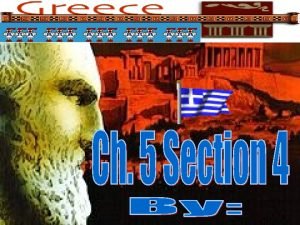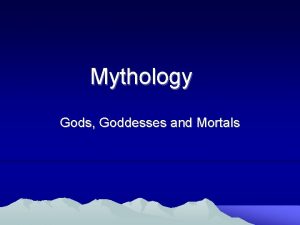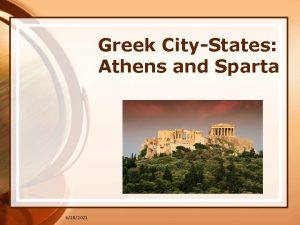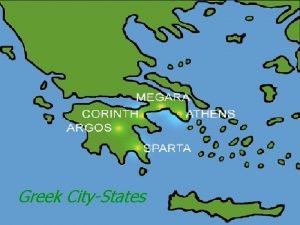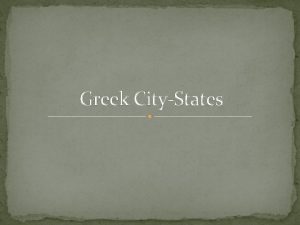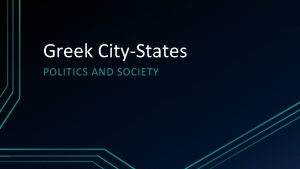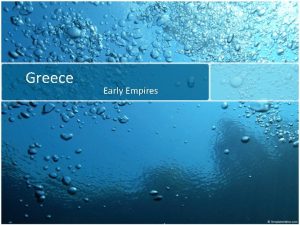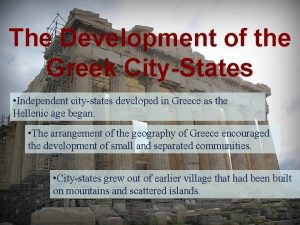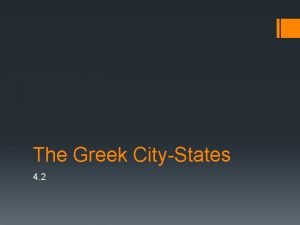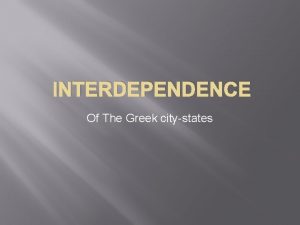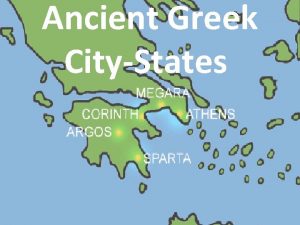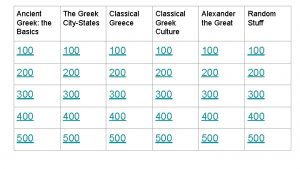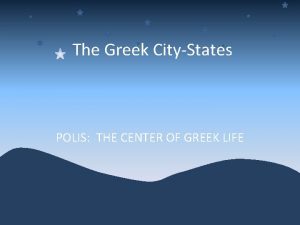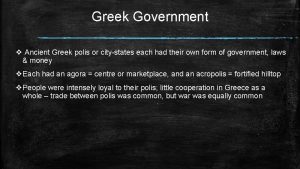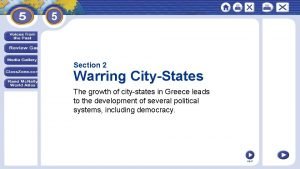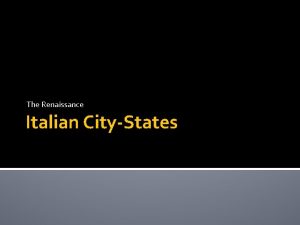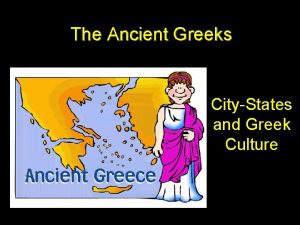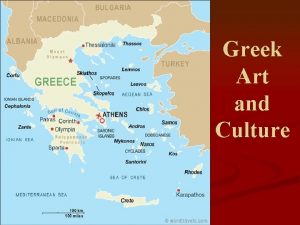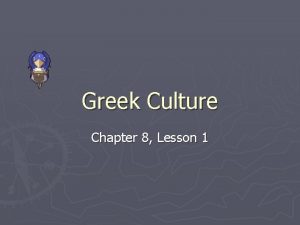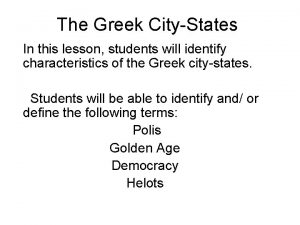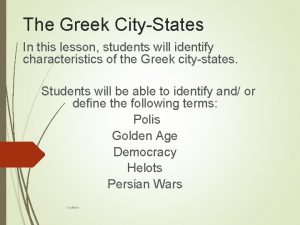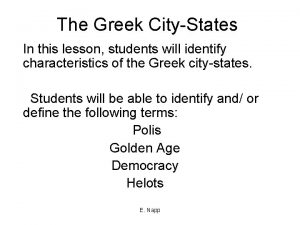CityStates and Greek Culture Chapter 8 Lesson 2

































- Slides: 33

City-States and Greek Culture Chapter 8 – Lesson 2

Vocabulary • Acropolis: It means “high city” in Greek.

• Agora: An open-air market and gathering place in many ancient Greek city-states.

• Oligarchy: A system in which a small group controls the government.

• Aristocracy: A wealthy ruling class

• Democracy: A governing system in which a countries people elect their leaders and ruled by the majority.

• Policy: A plan Action

• Barbarian: The name given by outsiders by the ancient Greeks and later by the ancient Romans.

Dark Ages (1, 100 to 750 B. C. ) • During 1, 100 B. C. Greece entered a period some historians call the Dark Ages. • Dark Ages is a time when many of the Aegean Civilizations were lost. • People remaining went back to living simpler lives. • Memories of the past was kept alive in songs, myths, & stories. • Dark Ages lasted until 750 B. C.

The Rise of City-States • After the Dark Ages, people began to once again live in small cities and trade with other culture. • These changes led to the rise of a new civilization that historians call Classical Greece.

The Rise of City-States Classical Greece started with the development of citystates. Why were City-States formed? • City-States were formed as people living in neighboring villages joined to protect themselves from outside dangers.

The Rise of City-States • Many groups built walled forts for safety. • Each fort was usually built on the hilltop. • These were called an Acropolis

The Rise of City-States • These newly developed villages with an acropolis grew into cities. – Houses – Public Buildings – An open-air market called and agora. • This all stood below the acropolis • Beyond the cities were farmlands and smaller villages. Agora

The Rise of City-States • Neighboring city-states often fought over the lands that remained between them. • As a result of this fighting over land, some citystates grew in size and importance – Best Known and most powerful Greek city states were Sparta & Athens. – Both city-states eventually developed different economies and governments.


Sparta : Location • Sparta had an inland location on the Peloponnesus peninsula. • Due to their location Spartan’s developed a military economy

Sparta : Culture • Spartan’s lived a simple life of hard work and physical activity. • 3 Classes in the Spartan Society

Sparta : Social Structure

Sparta : Social Structure • The lower classes in Sparta outnumbered the Spartan Citizens 10 to 1. • As a result the citizens feared the lower class. • Spartan Citizens were afraid of the lower class rebelling • They were afraid of attacks on Sparta from outsiders. • Because of these fears the Spartan Citizens focused on building a strong military.

Sparta : Culture • Spartan boys began military training to become soldiers from the age of 7. • There were 2 kings, each from different ruling families, that lead the Spartan army in times of war.

Sparta : Government Sparta used a government system known as Oligarchy.

Athens : Location • Located on Attica, a part of the Balkan Peninsula.

Athens : Government • After the “Dark Ages”, Athens was ruled by an aristocracy. • Leaders would struggle together for control of the city-state. • In 594 B. C. , Athenians asked a leader names Solon to make reforms in the government. • Solon divided the people of Athens into classes based on wealth instead of birth inheritance. • People with the most wealth became part of the ruling class.

Athens : Government • More reforms were made in 508 B. C. when Cleisthenes, one of the leaders, opened the government to all free men 18 years of age or older. • He created a new council. • Each year an election or draw was held to select a council of 500 male citizens. • This system of government was known as the first form of democracy. • Cleisnthenes’ reforms gave every adult male a chance to serve in the government.

Athens : Government

Athens : Government • Women had no voice in the government. • Women were allowed to become citizens. • Immigrant were not allowed to take part in the government.




To Be Greek • Each city-state was independent from each other. As a result they did not think of each other as a country. • Each city-state had a cultural identity that connected them with other city-states. • Greeks were set apart from the other people living in the Mediterranean region because the believed they were different from everyone else. . – Anyone who could not speak Greek was considered a Barbarian.

To Be Greek: Mythology • All the people of the different city-states shared common ancestor. – His name was Hellen – This is why they called there “country” the Hellas – The people called them selves Hellenes. *Known to us as Greeks* • The Hellenes believed that there god controlled events both in nature and in human life. – Zeus: Leader of the Gods – Athena: Goddess of wisdom and warfare – Aphrodite: Goddess of love and beauty. – Hermes: The messenger of Gods

To Be Greek: Olympics • Greeks were united by activities like the Olympics. • The Olympic Games were held every 4 years to honor Zeus. • The Hellenes believed that there god controlled events both in nature and in human life. – Zeus: Leader of the Gods – Athena: Goddess of wisdom and warfare – Aphrodite: Goddess of love and beauty. – Hermes: The messenger of Gods

To Be Greek Q: What common cultural identities brought the citystates together as Greeks? Answer: 1. Religion 2. Mythology 3. Language 4. Olympic Games
 Socratic problem
Socratic problem Agora
Agora Lesson 4 classical greek culture answer key
Lesson 4 classical greek culture answer key What makes greek culture unique
What makes greek culture unique Chapter 8 lesson 5 african american culture and politics
Chapter 8 lesson 5 african american culture and politics Time space compression ap human geography
Time space compression ap human geography Continuous culture and batch culture
Continuous culture and batch culture Difference between american and indian culture
Difference between american and indian culture Stab culture and stroke culture
Stab culture and stroke culture Folk culture and popular culture venn diagram
Folk culture and popular culture venn diagram Folk cultures are spread primarily by
Folk cultures are spread primarily by Anaerobic media
Anaerobic media Homework due today
Homework due today Carpet culture method
Carpet culture method Explain stab culture and stroke culture
Explain stab culture and stroke culture Surface culture deep culture and esol
Surface culture deep culture and esol Chapter 12 lesson 4 the late middle ages
Chapter 12 lesson 4 the late middle ages Guided reading greek civilization answer key lesson 2
Guided reading greek civilization answer key lesson 2 Chapter 8 lesson 2 the greek mind
Chapter 8 lesson 2 the greek mind Lesson 2 the greek city states
Lesson 2 the greek city states Individual culture traits combine to form culture patterns.
Individual culture traits combine to form culture patterns. Batch culture vs continuous culture
Batch culture vs continuous culture Characteristics of collectivism
Characteristics of collectivism Subculture group
Subculture group In an inert organizational culture,
In an inert organizational culture, Characteristics of quality culture
Characteristics of quality culture Taboos in greece
Taboos in greece Greek culture values
Greek culture values What city became the center of hellenistic greek culture?
What city became the center of hellenistic greek culture? The spread of greek culture
The spread of greek culture The greek miracle
The greek miracle Lesson 2 settlement culture and government of the colonies
Lesson 2 settlement culture and government of the colonies Steamboat willie
Steamboat willie Chapter 1 lesson 1 your total health
Chapter 1 lesson 1 your total health
